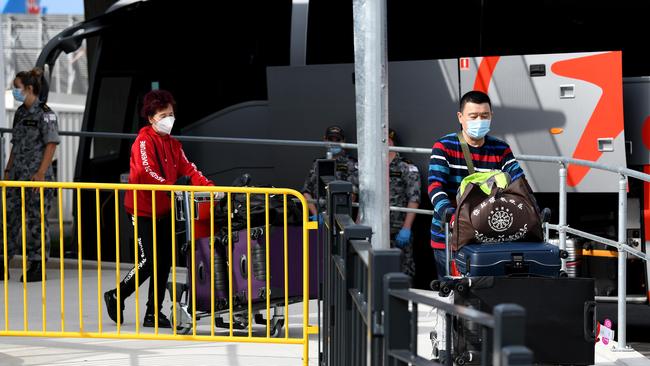Sick ‘horrified’ by corona hotel stays
Returning travellers with health conditions are being kept in the same NSW hotels as people who have tested positive for COVID.

Returning travellers with serious underlying health conditions have been alarmed to find themselves housed in the same NSW quarantine hotels as people who have tested positive for COVID.
Health experts warn that NSW’s “special health accommodation” is inherently flawed, with high density and poor ventilation, and liken it to “putting the fox in the chicken coop”.
Other states such as Victoria and South Australia have establishing medi-hotels exclusively for coronavirus cases, but NSW Health argues this is unnecessary because “there are designated floors for patients who are positive, negative or pending a result”.
Several returned travellers with underlying health conditions have told The Australian they were horrified to discover they would be in the same hotel as people who had tested positive.
Lynzie Chronis, who has Crohn’s disease, said she felt “nervous and confused that I’ve been put into a hotel with positive COVID people”.
Patients with Crohn’s disease, an inflammatory bowel illness, don’t have a higher risk of contracting the virus but some of the medications they take, such as corticosteroids, make them more susceptible to complications from COVID-19 and vulnerable to severe illness.
Ms Chronis, who recently returned from Canada, said she couldn’t understand “why a hotel quarantine, set up as a special hospital, would even take the slightest risk of transmission”.
“I do feel very uncomfortable knowing there are COVID cases in the hotel. As someone who is immune-compromised, I am anxious knowing I’m surrounded by others who can put me at risk.”
Ms Chronis, who spent 14 days in the hotel, is planning to dispute her accommodation fee.
Lisa Robertson, who has recently undergone major fertility surgery in the US, said she was concerned about “the spread of COVID through airconditioning, and the lack of deep cleaning between occupants in the hotels”.
“I’m nervous about staying where definite COVID positives are housed,” she said. “Ventilation systems are where the weaknesses are.”
Research shows breathing complications can be more severe for patients who contract the virus after an operation, and there is evidence of a higher death rate among these patients.
Nath Sem, who entered a SHA facility following major heart surgery, said she was also concerned about the potential for cross-transmission.
“I never felt safe in the place,” she said. “No one really knew what they were doing … staff are walking around the facility, delivering food and going on breaks in groups, not wearing masks or social distancing, entering my room and touching everything.
“The poor staff … they were all trying their best but were clearly overwhelmed.”
The SHA sites combine returned international travellers, domestic travellers and NSW residents who cannot safely isolate at home. Six hotels have been selected as SHA sites, with Meriton Suites at Mascot and Zetland the two major locations.
Unlike standard hotel quarantine facilities, SHA sites are managed by nursing and health staff rather than NSW Police and contracted security services.
Professor Shane Thomas of the ANU’s School of Population Health said the facilities were based on inherent flaws: “We need more serious design considerations of quarantine … these facilities should ring alarm bells.”
However, the Sydney Local Health District is confident that its approach is safe and effective.
“There are designated floors for patients who are positive, negative or pending a result,” a spokesman said in a statement.
“The physical separation of patient cohorts according to COVID-19 status is a critical part of infection prevention control.”




To join the conversation, please log in. Don't have an account? Register
Join the conversation, you are commenting as Logout